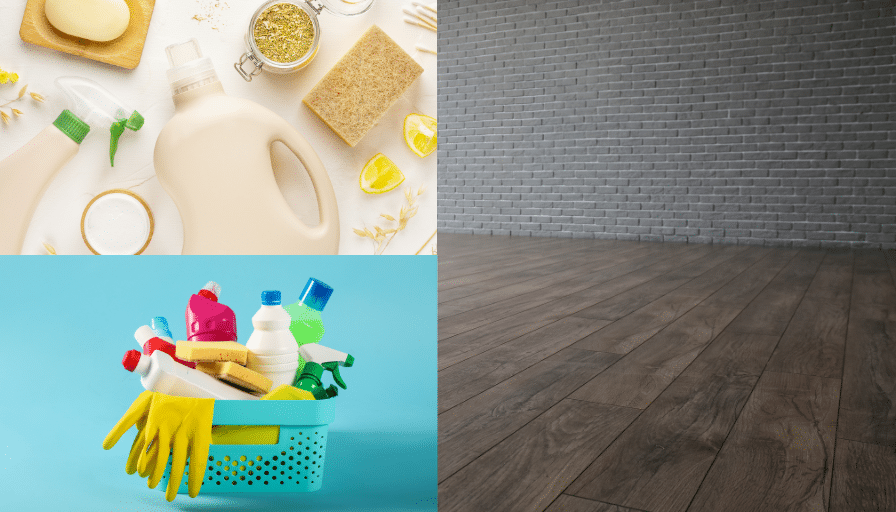Laminate flooring is a popular choice for many homeowners due to its durability and easy maintenance. However, when it comes to cleaning laminate flooring, using natural products is a preferable option for those who are concerned about the impact of harsh chemicals on their health and the environment.
This article will provide a comprehensive guide on how to clean laminate flooring using natural products, such as vinegar, baking soda, lemon juice, and essential oils. Additionally, it will discuss the benefits of using microfiber mops and cloths as gentle and efficient cleaning tools.
Furthermore, readers will find a collection of homemade cleaning solution recipes that will help maintain a spotless laminate floor. By following these methods, homeowners can effectively clean their laminate flooring without compromising on their health or the environment.
Key Takeaways
- Natural cleaning products such as vinegar, baking soda, lemon juice, and essential oils are effective for cleaning laminate flooring.
- Microfiber mops and cloths are gentle and efficient cleaning tools for laminate flooring.
- Homemade cleaning solutions using vinegar, water, and essential oils are eco-friendly and safe for laminate flooring.
- Using natural cleaning solutions eliminates the risk of toxic residue and contributes to a healthier indoor environment while maintaining the beauty of laminate flooring.
Vinegar: A Natural Cleaning Solution
Vinegar, a natural cleaning solution, offers a practical and eco-friendly alternative for maintaining the cleanliness and longevity of laminate flooring. With its acidic properties, vinegar effectively removes dirt, grime, and stubborn stains from laminate surfaces.
The acidity of vinegar also helps to disinfect the flooring, eliminating bacteria and germs that may be present. Additionally, vinegar is a cost-effective option as it is readily available and inexpensive compared to commercial cleaning products.
However, it is important to note that vinegar may not be suitable for all types of laminate flooring, particularly those with a wax or oil finish. In such cases, it is advisable to explore alternative natural cleaning solutions such as using a mixture of water and mild dish soap.
Baking Soda: A Versatile Cleaning Agent
Baking soda, a multifunctional cleaning substance, offers a wide array of uses for effectively maintaining the cleanliness and appearance of laminate surfaces.
Its versatility as a cleaning agent is due to its abrasive nature, which allows it to tackle tough stains and grime without damaging the laminate flooring.
Baking soda can be used as a gentle scrubbing agent when mixed with water, creating a paste that can be applied to the stained area and then wiped clean.
Additionally, it can be sprinkled directly onto the floor and then mopped up to eliminate odors and freshen the space.
The benefits of using baking soda extend beyond its cleaning capabilities, as it is also a natural deodorizer and can help to absorb excess moisture, preventing the growth of mold and mildew.
Lemon Juice: A Fresh and Effective Cleaner
Lemon juice, a refreshing and potent solution, offers an effective and invigorating approach to maintaining the cleanliness and appearance of various surfaces.
When it comes to cleaning laminate flooring, lemon juice presents several benefits. Firstly, its natural acidity makes it a powerful degreaser, removing stubborn stains and grime. Additionally, lemon juice has natural antibacterial properties, making it an ideal choice for sanitizing surfaces. Its fresh scent also leaves a pleasant fragrance in the air, eliminating odors and creating a clean atmosphere.
However, if lemon juice is not readily available, there are alternative natural cleaners that can be used on laminate flooring. Vinegar, for instance, can be diluted with water to create a gentle yet effective cleaning solution. Alternatively, a mixture of baking soda and water can be used to tackle tough stains.
Overall, incorporating lemon juice or its alternatives into a cleaning routine can be an efficient and eco-friendly way to maintain the beauty and cleanliness of laminate flooring.
Essential Oils: Adding Fragrance and Cleaning Power
Essential oils, with their aromatic properties and cleaning capabilities, can provide a fragrant and effective alternative for maintaining the cleanliness and freshness of various surfaces. When it comes to cleaning laminate flooring, essential oils can be blended together to maximize their effectiveness.
Different essential oils possess distinct cleaning properties that can target specific stains and odors. For instance, lemon essential oil is known for its grease-cutting abilities, while tea tree oil has antimicrobial properties that can help eliminate bacteria and fungi. Lavender essential oil, on the other hand, can provide a calming and soothing aroma while also acting as a natural disinfectant.
By blending these essential oils, individuals can create a customized cleaning solution that not only effectively cleans the laminate flooring but also leaves behind a pleasant and refreshing scent.
Microfiber Mops and Cloths: Gentle and Efficient Cleaning Tools
Microfiber mops and cloths are highly recommended cleaning tools due to their gentle yet efficient nature in maintaining the cleanliness and freshness of various surfaces, including laminate flooring.
The benefits of using microfiber mops for cleaning laminate flooring are numerous. Firstly, microfiber is a soft and non-abrasive material that helps prevent scratches or damage to the laminate surface. Additionally, the microscopic fibers in the mop effectively capture and trap dust, dirt, and allergens, leaving the floor clean and free from debris.
Proper usage of a microfiber mop involves using it dry or slightly damp, as excessive moisture can cause damage to laminate flooring. Moreover, microfiber mops should be cleaned regularly to ensure their effectiveness, either by washing them in the washing machine or handwashing with mild detergent.
Overall, microfiber mops and cloths prove to be gentle yet powerful cleaning tools for maintaining the cleanliness and longevity of laminate flooring.
Homemade Cleaning Solutions: Recipes for a Spotless Laminate Floor
One effective strategy for maintaining the cleanliness and shine of laminate flooring is to utilize homemade cleaning solutions. These eco-friendly options for cleaning laminate flooring offer several benefits over conventional chemical cleaners.
Natural cleaning solutions are made from readily available ingredients such as vinegar, water, and essential oils, which are not only safe for the environment but also gentle on the laminate surface. Vinegar, in particular, is known for its ability to remove dirt, grime, and streaks, leaving the laminate floor spotless.
Additionally, the use of natural cleaning solutions eliminates the risk of toxic residue that can be left behind by commercial cleaners. By opting for homemade cleaning solutions, homeowners can ensure the longevity and beauty of their laminate flooring while contributing to a healthier indoor environment.
Frequently Asked Questions
Can I use regular vinegar instead of white vinegar for cleaning laminate flooring?
Regular vinegar can be used as an alternative to white vinegar for cleaning laminate flooring. Both types of vinegar have similar acidity levels, making them effective natural cleaning agents. The benefits of using natural products for cleaning include eco-friendliness and avoidance of harmful chemicals.
Will baking soda scratch or damage the laminate flooring surface?
Baking soda can potentially scratch or damage the surface of laminate flooring due to its abrasive nature. Alternative cleaning methods such as using a mixture of water and vinegar or a mild soap solution may be safer options for maintaining the integrity of the flooring.
How long can I store homemade cleaning solutions made with natural ingredients?
The shelf life of homemade cleaning solutions made with natural ingredients varies depending on the specific ingredients used. It is recommended to store these solutions in airtight containers in a cool, dark place to prolong their shelf life.
Are there any essential oils that should be avoided when cleaning laminate flooring?
When cleaning laminate flooring, it is important to consider the potential harm essential oils may pose to pets. Some essential oils can be toxic to animals. Natural alternatives to essential oils for cleaning laminate flooring include vinegar, baking soda, and lemon juice.
Can I use a regular mop instead of a microfiber mop for cleaning laminate flooring?
Using a regular mop instead of a microfiber mop for cleaning laminate flooring may not be as effective due to potential scratching and streaking. However, the benefits of using natural products for cleaning laminate flooring include eco-friendliness and avoidance of harsh chemicals.
Conclusion
In conclusion, cleaning laminate flooring with natural products is an effective and eco-friendly approach.
Vinegar, baking soda, lemon juice, and essential oils are all great options for removing dirt and grime from laminate surfaces.
Microfiber mops and cloths are gentle yet efficient tools that can help achieve a spotless floor.
By using homemade cleaning solutions, one can ensure a clean and healthy living environment without relying on harsh chemicals.
With these natural cleaning methods, maintaining laminate flooring becomes a simple and sustainable task.


